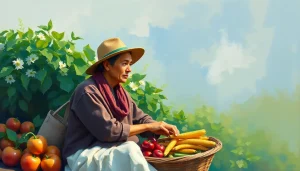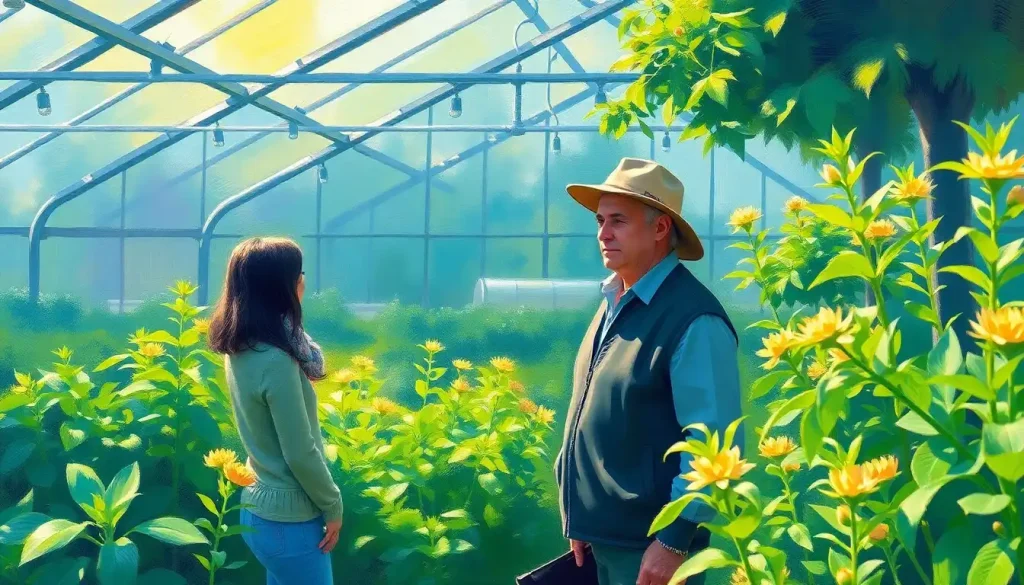From farm-fresh innovations to lab-grown revolution, a new wave of investment opportunities is transforming our plates and portfolios while tackling some of humanity’s most pressing challenges. The world of sustainable food investing is rapidly expanding, offering a tantalizing blend of financial potential and positive impact. As we grapple with climate change, population growth, and resource scarcity, the need for innovative solutions in our food systems has never been more urgent.
Sustainable food investing isn’t just a passing trend; it’s a powerful movement reshaping the way we produce, distribute, and consume food. At its core, this approach to investing seeks to support companies and technologies that promote environmental stewardship, social responsibility, and economic viability throughout the food value chain. From farm to fork, investors are increasingly recognizing the potential to generate returns while contributing to a more sustainable and equitable food future.
The global interest in sustainable food systems has surged in recent years, driven by a perfect storm of factors. Consumers are becoming more conscious of the environmental and health impacts of their food choices. Governments are implementing policies to address climate change and food security. And innovative startups are disrupting traditional food industries with groundbreaking technologies and business models.
The Current Landscape: A Feast of Opportunities
The sustainable food market is no longer a niche sector – it’s a burgeoning industry with impressive growth projections. According to recent reports, the global sustainable food market is expected to reach $1.1 trillion by 2027, growing at a compound annual growth rate of 11.2% from 2020 to 2027. This staggering growth is attracting attention from investors across the spectrum, from venture capitalists to institutional investors.
Key players in the sustainable food industry include both established food giants pivoting towards sustainability and innovative startups disrupting the status quo. Companies like Beyond Meat and Impossible Foods have become household names, while regenerative agriculture startups like Indigo Agriculture are revolutionizing farming practices. Even traditional food companies are getting in on the action, with Nestlé, Unilever, and Danone all making significant investments in sustainable food initiatives.
Emerging trends and technologies are shaping the future of sustainable food. Vertical farming is transforming urban agriculture, while precision fermentation is enabling the creation of animal-free dairy products. Vegan investing has gained traction as plant-based alternatives continue to disrupt traditional meat and dairy markets. Meanwhile, blockchain technology is enhancing food traceability, and artificial intelligence is optimizing crop yields and reducing food waste.
A Smorgasbord of Investment Opportunities
The sustainable food sector offers a diverse menu of investment opportunities, catering to various risk appetites and impact goals. One of the most prominent areas is plant-based and alternative proteins. As consumers increasingly seek out meat alternatives for health and environmental reasons, companies developing innovative plant-based, fermentation-derived, and cell-cultured proteins are attracting significant investment.
Regenerative agriculture is another exciting frontier in sustainable food investing. This approach to farming aims to restore soil health, enhance biodiversity, and sequester carbon. Investors are backing companies that provide tools, technologies, and services to support regenerative practices, from soil sensors to carbon credit marketplaces.
Food waste reduction technologies present another compelling investment opportunity. With roughly one-third of all food produced globally going to waste, solutions that address this issue have enormous potential. From AI-powered inventory management systems to upcycling technologies that transform food byproducts into valuable ingredients, investors are finding innovative ways to tackle this $1 trillion problem.
Sustainable packaging solutions are also garnering attention from investors. As consumers and regulators push for alternatives to single-use plastics, companies developing biodegradable, compostable, or reusable packaging are seeing increased demand. This sector intersects with the broader trend of green investing in the UK and other markets where environmental concerns are driving policy and consumer behavior.
Navigating the Challenges: A Recipe for Success
While the potential rewards of sustainable food investing are substantial, it’s not without its challenges. Regulatory hurdles and policy changes can significantly impact the viability of certain technologies or business models. For instance, the regulatory landscape for cell-cultured meat is still evolving, creating uncertainty for investors in this space.
Scalability is another critical challenge. Many sustainable food technologies that show promise in the lab or small-scale trials face significant hurdles when it comes to scaling up to commercial production. Investors need to carefully assess a company’s ability to overcome these challenges and achieve economies of scale.
Consumer adoption and behavior change represent both an opportunity and a risk. While there’s growing demand for sustainable food options, shifting long-established dietary habits and overcoming price premiums can be a slow process. Investors should consider the potential for consumer education and marketing to drive adoption.
Competition from traditional food industries is also a factor to contend with. Established players have significant resources and market share, and many are actively investing in their own sustainable initiatives. This can create a challenging competitive landscape for startups and new entrants.
Strategies for Savvy Sustainable Food Investing
Success in sustainable food investing requires a thoughtful approach and a long-term perspective. Due diligence and impact assessment are crucial. Investors should thoroughly evaluate not only the financial potential of a company or technology but also its genuine sustainability impact. Tools like the UN Sustainable Development Goals (SDGs) can provide a framework for assessing impact, aligning with the principles of SDG investing.
Diversification across the sustainable food value chain can help mitigate risks and capture opportunities at various stages of development. This might include investments in agricultural technologies, food processing innovations, distribution solutions, and consumer-facing brands.
Collaboration with industry experts and organizations is invaluable in navigating this complex and rapidly evolving sector. Partnerships with universities, research institutions, and industry associations can provide crucial insights and access to emerging technologies. For those looking to gain hands-on experience in the field, sustainable investing internships can be an excellent way to build knowledge and networks.
A long-term investment horizon is essential in sustainable food investing. Many of the most impactful solutions may take years to reach their full potential, both in terms of financial returns and sustainability impact. Patience and a commitment to supporting companies through various stages of growth are often rewarded in this sector.
The Future: A Feast for the Imagination
The future of sustainable food investing is brimming with potential for disruptive innovations. From lab-grown meat that could revolutionize protein production to AI-powered farming systems that optimize resource use, the possibilities are vast. As these technologies mature, we’re likely to see increased integration of sustainable food practices in mainstream industries, creating new opportunities for investors.
Global expansion presents another exciting frontier. As developing countries grapple with food security challenges and seek to leapfrog unsustainable agricultural practices, there’s enormous potential for sustainable food solutions to make a significant impact. This aligns with the broader trend of roots investing, which focuses on building wealth through sustainable and ethical approaches that benefit local communities.
The role of sustainable food investing in achieving the UN Sustainable Development Goals cannot be overstated. From SDG 2 (Zero Hunger) to SDG 13 (Climate Action), sustainable food systems are integral to meeting these global objectives. This connection underscores the potential for sustainable food investments to generate both financial returns and meaningful positive impact.
A Taste of What’s to Come
As we look to the future, it’s clear that sustainable food investing is not just about nourishing our bodies – it’s about nourishing our planet and our portfolios. The sector offers a rare combination of financial opportunity and the chance to contribute to solving some of humanity’s most pressing challenges.
From the fields of regenerative agriculture to the labs developing next-generation proteins, from innovative packaging solutions to technologies combating food waste, the sustainable food sector is ripe with opportunity. As an investor, you have the power to support these transformative innovations and potentially reap the rewards of being at the forefront of a global shift towards more sustainable food systems.
Biodiversity investing and natural capital investing are closely related fields that offer complementary opportunities for those interested in supporting broader ecosystem health alongside sustainable food systems. These approaches recognize the intrinsic value of nature and its critical role in supporting sustainable agriculture and food production.
For those intrigued by the potential of sustainable agriculture, O farming investing offers a unique approach that focuses on organic and regenerative practices. This niche within sustainable food investing aligns closely with principles of soil health and ecosystem restoration.
As you consider your investment strategy, remember that sustainable food investing is not just about following trends – it’s about being part of a movement that’s reshaping our relationship with food, our planet, and each other. Whether you’re drawn to the innovative potential of food tech startups, the transformative power of regenerative agriculture, or the global impact of sustainable food systems, there’s a place for you in this exciting and rapidly evolving sector.
Swell investing, which focuses on sustainable investment strategies for socially conscious investors, offers another avenue to explore for those looking to align their portfolios with their values while supporting sustainable food initiatives.
In conclusion, sustainable food investing represents a powerful opportunity to nourish not just our bodies, but our planet and our portfolios. As we face unprecedented global challenges, from climate change to food insecurity, the innovations and solutions emerging from this sector offer hope for a more sustainable and equitable future. By investing in sustainable food systems, you’re not just potentially securing your financial future – you’re helping to secure the future of our planet. So, as you consider your next investment move, ask yourself: are you ready to take a bite out of the sustainable food revolution?
References:
1. Meticulous Research. (2020). Sustainable Food Market – Global Opportunity Analysis and Industry Forecast (2020-2027).
2. Food and Agriculture Organization of the United Nations. (2011). Global food losses and food waste – Extent, causes and prevention.
3. United Nations. (2015). Sustainable Development Goals.
4. RethinkX. (2019). Rethinking Food and Agriculture 2020-2030.
5. World Economic Forum. (2020). The Future of Nature and Business.
6. Project Drawdown. (2020). Table of Solutions. https://drawdown.org/solutions/table-of-solutions
7. Ellen MacArthur Foundation. (2019). Cities and Circular Economy for Food.
8. International Panel of Experts on Sustainable Food Systems (IPES-Food). (2016). From uniformity to diversity: a paradigm shift from industrial agriculture to diversified agroecological systems.
9. The Good Food Institute. (2021). State of the Industry Report: Plant-based meat, eggs, and dairy.
10. McKinsey & Company. (2020). Agriculture’s connected future: How technology can yield new growth.












Would you like to add any comments? (optional)